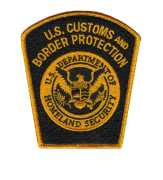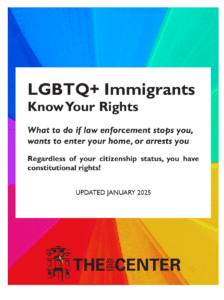LGBTQ+ Immigrants
Know Your Rights

KNOW YOUR RIGHTS
Remain Silent
Speak to a Lawyer
Make a Phone Call
Download the PDF / Descarga el PDF
- LGBTQ+ Immigrants: Know Your Rights – San Diego / The San Diego LGBT Community Center
- Inmigrantes LGBTQ+: Conozca Sus Derecho – San Diego / Centro Comunitario LGBT de San Diego
- LGBTQ+ Immigrants: Know Your Rights – (not San Diego specific)
- Inmigrantes LGBTQ+: Conozca Sus Derecho – (no específico a San Diego)
Download the Immigration Directory San Diego LGBTQ+ / Descarga el Directorio de Inmigración San Diego LGBTQ+
LGBTQ+ IMMIGRANTS
In these challenging times, we recognize the profound impact that immigration raids, deportations, and an anti-immigration narrative have on LGBTQ+ migrants. These actions not only threaten the stability and safety of our community but also exacerbate anxieties around accessing essential services such as healthcare, medication, housing, and shelter. The fear of being detained or deported can lead to avoidance of seeking necessary support, further marginalizing those who are already vulnerable.
At The San Diego LGBT Community Center, we are committed to providing resources and support to help navigate these uncertainties. We stand with you and offer a safe space where you can find the information and assistance you need.
The Center’s Free Resources Include:
- Mental Health—Behavioral Health Services
- Sexual Health & Wellness—Free HIV Testing and STI Screening
- Food Resources—Monthly Neighborhood Food Bank and Senior Food Bank
- Project Compassion—Free resources like socks, toiletries, clothes, food, water, Thurs 10am-2pm
- Youth Housing—LGBTQ Safe STAY emergency shelter, Host Home program, and permanent supportive housing
- Adult Housing—housing navigation and stability support, temporary stays with case management, move-in assistance, eviction prevention, linkages to health services
- Legal Services Referrals & Advocacy
Protections from the State of California
California has enacted several laws to protect the rights and well-being of immigrants, including:
- California Values Act (SB 54): Limits state and local law enforcement’s cooperation with federal immigration authorities, ensuring that local resources are not used for immigration enforcement.
- TRUTH Act: Requires local law enforcement to inform individuals in custody about their rights and provide written consent forms before any interview with ICE.
- AB 953 (Racial and Identity Profiling Act): Prohibits racial and identity profiling by law enforcement and mandates data collection on stops and searches to ensure accountability.
- Access to Health Care: California law ensures that all residents, regardless of immigration status, have access to emergency medical care.
- Housing Protections: Housing providers cannot inquire about your immigration status unless you are applying for federally funded affordable housing. They are also prohibited from harassing or intimidating you based on your immigration status.
These protections are designed to uphold the dignity and rights of all immigrants, ensuring that you can live without fear and access the services you need.
INMIGRANTES LGBTQ+
En estos tiempos difíciles, reconocemos el profundo impacto que las redadas de inmigración, las deportaciones, y una narrativa antiinmigración tienen sobre los migrantes LGBTQ+. Estas acciones no solo amenazan la estabilidad y seguridad de nuestra comunidad, sino que también exacerban las ansiedades en torno al acceso a servicios esenciales como atención médica, medicamentos, vivienda y refugio. El miedo sobre detención y deportación puede hacer que se evite buscar el apoyo necesario, marginando aún más a quienes ya son vulnerables.
En el Centro Comunitario LGBT de San Diego, estamos comprometidos a brindar recursos y apoyo para ayudar a superar estas incertidumbres. Estamos a su lado y ofrecemos un espacio seguro donde puede encontrar la información y la asistencia que necesita.
Los recursos gratuitos de The Center incluyen:
- Salud mental—Servicios de salud conductual
- Salud y bienestar sexual—Pruebas de VIH y detección de ITS gratuitas
- Recursos alimentarios—Banco de alimentos mensual para el vecindario y banco de alimentos para personas mayores
- Proyecto Compasión—Recursos gratuitos como calcetines, artículos de tocador, ropa, comida, agua, jueves de 10 a. m. a 2 p. m.
- Vivienda para jóvenes—Refugio de emergencia LGBTQ Safe STAY, programa de hogar anfitrión y vivienda de apoyo permanente
- Vivienda para adultos—Apoyo a la navegación y la estabilidad de la vivienda, estancias temporales con gestión de casos, asistencia para la mudanza, prevención de desalojos, vínculos con servicios de salud
- Referencias y defensa de servicios legales
Protecciones del Estado de California
California ha promulgado varias leyes para proteger los derechos y el bienestar de los inmigrantes, entre ellas:
- Ley de Valores de California (SB 54): Limita la cooperación de las autoridades estatales y locales con las autoridades federales de inmigración, garantizando que los recursos locales no se utilicen para la aplicación de la ley.
- Ley TRUTH: Requiere que las autoridades locales informen a las personas bajo custodia sobre sus derechos y proporcionen formularios de consentimiento por escrito antes de cualquier entrevista con ICE.
- AB 953 (Ley de Perfilamiento Racial y de Identidad): Prohíbe el perfilamiento racial y de identidad por parte de las fuerzas del orden y exige la recopilación de datos sobre detenciones y registros para garantizar la rendición de cuentas.
- Acceso a atención médica: la ley de California garantiza que todos los residentes, independientemente de su estatus migratorio, tengan acceso a atención médica de emergencia.
- Protecciones de vivienda: Los proveedores de vivienda no pueden preguntar sobre su estado migratorio a menos que esté solicitando una vivienda asequible financiada con fondos federales. También tienen prohibido acosarlo o intimidarlo según su estado migratorio.
Estas protecciones están diseñadas para defender la dignidad y los derechos de todos los inmigrantes, garantizando que puedan vivir sin miedo y acceder a los servicios que necesitan.
What to do if the Police, FBI, or ICE stop you
WHAT TO DO IF THE POLICE, FBI, OR ICE STOP YOU
- You have the right to REMAIN SILENT. To exercise this right, you should tell the police, “I want to remain silent.” Even if you answer some questions, you can still decide you don’t want to answer any additional ones.
- You have the right to SPEAK TO A LAWYER. Tell the officer you’d like to speak to an attorney or your consulate. You are not required to answer any questions.
- You have the right to MAKE A PHONE CALL if you are arrested. If you are not on probation or parole, you never have to consent to a search of yourself, your belongings, your car, or your house. You should say, “I do not consent to this search.”
You should ask, “Am I under arrest? Am I free to go?” Unless you do, the stop is considered voluntary, and thus legal. If you don’t get a response, keep asking the question until you do.
You have the RIGHT TO AN ATTORNEY if you are arrested. Request one immediately. If you are detained by ICE or CBP, an attorney will not be provided, but you have the right to get one yourself.
If you are a U.S. citizen, you are not required to present any documents with your name, age, place of birth, nationality, or legal status. If you are undocumented and don’t have valid immigration documents, remember, you can decide not to answer questions about your immigration status or whether you have immigration documents.
If you are a documented immigrant 18 years or older and have been issued valid immigration documents, you are legally required to carry these documents with you at all times. It is usually a good idea to show the documents to avoid arrest.
Don’t sign anything you don’t understand!
QUÉ HACER SI LA POLICÍA, EL FBI O EL ICE LO DETIENEN
- Tiene derecho a GUARDAR SILENCIO. Para ejercer este derecho, debe decirle a la policía: “Quiero guardar silencio”. Incluso si responde algunas preguntas, aún puede decidir que no desea responder ninguna más.
- Tiene derecho a HABLAR CON UN ABOGADO. Dígale al oficial que le gustaría hablar con un abogado o con su consulado. No es necesario que responda ninguna pregunta.
- Tiene derecho a HACER UNA LLAMADA TELEFÓNICA si lo arrestan. Si no está en libertad condicional, nunca tendrá que dar su consentimiento para que revisen a su persona, sus pertenencias, a su automóvil o a su casa. Debe decir: “No doy mi consentimiento para esta búsqueda”.
Debería preguntar: “¿Estoy bajo arresto? ¿Soy libre de irme?” Al no hacerlo, el detenerse se considera voluntario y, por tanto, legal. Si no recibe una respuesta, siga haciendo la pregunta hasta que la obtenga.
Usted tiene DERECHO A UN ABOGADO si lo arrestan. Solicite uno de inmediato. Si es detenido por ICE o CBP, no se le proporcionará un abogado, pero tiene derecho a conseguir uno usted mismo.
Si es ciudadano estadounidense, no está obligado a presentar ningún documento con su nombre, edad, lugar de nacimiento, nacionalidad o estatus legal. Si es indocumentado y no tiene documentos migratorios válidos, recuerde que puede decidir no responder preguntas sobre su estatus migratorio o si tiene documentos migratorios.
Si es un inmigrante documentado mayor de 18 años y se le han emitido documentos de inmigración válidos, está obligado por ley a llevar estos documentos con usted en todo momento. Generalmente es una buena idea mostrar los documentos para evitar el arresto.
¡No firme nada que no entienda!
What to do if Police want to enter your home
WHAT TO DO IF POLICE WANT TO ENTER YOUR HOME
If an officer wants to enter your home, you have rights and they need a warrant.
DO NOT OPEN THE DOOR.
- Ask the officer to IDENTIFY themselves and show proof they are serving as an agent of the agency they say they represent.
- Ask to SEE A WARRANT. Ask the officer to slide the warrant under the door. REVIEW THE WARRANT and make sure it authorizes officers to enter your home and search your property.
- If they do not have a warrant, officers are not authorized to enter. YOU SHOULD NOT GIVE THEM PERMISSION TO ENTER. Tell them, “I do not give you permission to enter my home.”
- If the officers don’t have a warrant and still enter your home, don’t try to stop them. Tell them clearly, “I do not give you permission to be in my home.” Write down the name and badge numbers of all the officers involved in order to file a complaint.
- If the officers do have a warrant, they can enter your home. However, they can only search for the person or objects associated with the warrant. The
warrant may limit them to a certain room or to search for a particular item. Read it carefully before you allow them to enter your home, and do not give permission for officers to search beyond the warrant’s limits. - If the warrant is for one person and they are home, it may be best for that person to come outside to avoid having the officers come inside. Always open the door slightly; never open the door wide open.
QUÉ HACER SI LA POLICÍA QUIERE ENTRAR A SU CASA
Si oficiales quieren entrar a su casa, usted tiene derechos y necesitan una orden judicial.
NO ABRA LA PUERTA.
- Pídale al oficial que se IDENTIFIQUE y muestre prueba de que se desempeña como agente de la agencia que dice representar.
- Pida VER UN ORDEN. Pídale al oficial que deslice la orden por debajo de la puerta. REVISE LA ORDEN y asegúrese de que autorice a los agentes a entrar a su casa y registrar su propiedad.
- Si no tienen una orden judicial, los oficiales no están autorizados a ingresar. NO DEBES DARLES PERMISO PARA ENTRAR. Dígales: “No les doy permiso para entrar a mi casa”.
- Si los agentes no tienen una orden judicial y aun así entran a su casa, no intente detenerlos. Dígales claramente: “No les doy permiso para estar en mi casa”. Anote el nombre y los números de placa de todos los agentes involucrados para poder presentar una denuncia.
- Si los agentes tienen una orden judicial, pueden entrar a su casa. Sin embargo, sólo pueden buscar a la persona u objetos asociados con la orden. La orden judicial puede limitarlos a una determinada habitación o buscar un artículo en particular. Léalo antes de permitirles entrar a su casa y no dé permiso a los agentes para que busquen más allá de los límites de la orden.
- Si la orden es para una persona y está en casa, puede ser mejor que esa persona salga para evitar que los oficiales entren. Abra siempre ligeramente la puerta; Nunca abras la puerta de par en par.
How to Recognize Law Enforcement Branches / Cómo reconocer las ramas de agencias de aplicación de la ley
San Diego County Sheriff
Sheriff deputies generally wear a tan shirt and olive/green pants. Their patch is on their right hand sleeve. They wear a badge above their left front pocket. Imperial County deputies’ uniforms are similar.

Sheriff del condado de San Diego
Los ayudantes del sheriff generalmente visten una camisa color canela y pantalones verde oliva. Su parche está en la manga derecha. Llevan una insignia encima del bolsillo delantero izquierdo. Los uniformes de los agentes del condado de Imperial son similares.
San Diego Police Department
SDPD officers wear matching very dark blue (looks like black) pants and shirt. They have patches on both sleeves. They wear a badge above their left front pocket.

Departamento de Policía de San Diego (SDPD)
Los oficiales del SDPD visten pantalones y camisa de color azul muy oscuro (parece negro) a juego. Tienen parches en ambas mangas. Llevan una insignia encima del bolsillo delantero izquierdo.
Immigration and Customs Enforcement (ICE)
ICE officers look similar to SDPD officers. They generally wear matching dark blue (looks like black) pants and shirt, though they may wear khaki pants and sometimes may even wear jeans. They often wear a vest that says “POLICE ICE.” They often don’t wear a uniform with a patch.

Servicio de Inmigración y Aduanas (ICE)
Los oficiales de ICE se parecen a los oficiales del SDPD. Por lo general, usan pantalones y camisa de color azul oscuro (parece negro) a juego, aunque pueden usar pantalones caqui y, a veces, incluso jeans. A menudo usan un chaleco que dice “POLICE ICE”. A menudo no llevan uniforme con parche.
U.S. Border Patrol
Patrol officers generally wear matching green pants and shirt. They wear a patch on their left arm that says “U.S. Border Patrol” and a “U.S. Customs and Border Protection” patch on their right arm.

Patrulla Fronteriza de EE. UU.
Los agentes de patrulla generalmente visten pantalones y camisa verdes a juego. Llevan un parche en el brazo izquierdo que dice “U.S. Border Patrol” y un parche que dice “U.S. Customs and Border Protection” en su brazo derecho.
What to do if you are arrested
WHAT TO DO IF YOU ARE ARRESTED
Above all, stay calm.
- Remain silent. You have the right to remain silent. You do not have to answer questions. You should tell the officer that you want to speak to an attorney before answering any questions. Say, “I will remain silent until I speak to an attorney.”
- Identify which agency arrested you. Write down the name of the officers and their agency (San Diego Police Department, FBI, Imperial County Sheriff, ICE, etc.) and their identification numbers and license plate numbers. You can find this information on their uniforms or their cars. If you don’t have a pen or paper, remember at least one name and number.
- Don’t sign any documents before speaking with a lawyer. You always have the right to speak with a lawyer. The officers may try to intimidate you or trick you into signing. Don’t let yourself be tricked! You may be signing away your right to a hearing before an immigration judge!
- Contact your attorney or a family member. You have the right to make a telephone call after you are arrested. You should memorize the phone number of your attorney, family member, friend, or union
representative so you can call in an emergency. - Contact your consulate if you are a foreign national arrested in the United States. You have the right to call your consulate or to have the deportation officer inform your consulate of your arrest. Ask the deportation officer to see a list of embassies and write down the phone number. The consul may assist you in finding a lawyer or offer to contact your family.
- Ask for bond once you’re in immigration custody. Ask for bond even if the officers tell you that you are not eligible. You will have to show that you are not a flight risk or a danger to the community. Ask your family to start gathering documents to show that you have a connection to the U.S. (examples: evidence that family members are U.S. citizens or legal permanent residents; check stubs; rental agreements, etc.).
QUÉ HACER SI LE ARRESTAN
Sobre todo, mantenga la calma.
- Permanezca en silencio. Tiene derecho a permanecer en silencio. No es necesario que responda preguntas. Debe decirle al oficial que desea hablar con un abogado antes de responder cualquier pregunta. Diga: “Permaneceré en silencio hasta hablar con un abogado”.
- Identifique qué agencia lo arrestó. Escriba el nombre de los oficiales y su agencia (Departamento de Policía de San Diego, FBI, Sheriff del Condado de Imperial, ICE, etc.) y sus números de identificación y números de matrícula. Puedes encontrar esta información en sus uniformes o en sus coches. Si no tienes lápiz o papel, recuerda al menos un nombre y un número.
- No firme ningún documento antes de hablar con un abogado. Siempre tiene derecho a hablar con un abogado. Los oficiales pueden intentar intimidarlo o engañarlo para que firme. ¡No se deje engañar! Es posible que esté renunciando a su derecho a una audiencia ante un jurado de inmigración.
- Comuníquese con su abogado o un miembro de su familia. Tiene derecho a hacer una llamada telefónica después de ser arrestado. Debe memorizar el número de teléfono de su abogado, familiar, amigo o representante de sindicato para que pueda llamar en caso de emergencia.
- Comuníquese con su consulado si es un ciudadano extranjero arrestado en los Estados Unidos. Tiene derecho a llamar a su consulado o a que el oficial de deportación le informe de su arresto. Pregúntale al oficial de deportación para ver una lista de embajadas y anotar el número de teléfono. El cónsul puede ayudarle a encontrar un abogado u ofrecerle ponerse en contacto con su familia.
- Solicite una fianza una vez que esté en custodia. Solicite una fianza incluso si los oficiales le dicen que no es elegible. Tendrás que demostrar que no representas un riesgo de fuga ni un peligro para la comunidad. Pídale a su familia que comience a reunir documentos para demostrar que usted tiene una conexión con los EE. UU. (ejemplos: evidencia de que los miembros de la familia son ciudadanos estadounidenses o residentes legales permanentes; talones de cheques; contratos de alquiler, etc.).
RESOURCES / RECURSOS
San Diego County
ACLU San Diego and Imperial Counties
Immigration Equality
Transgender Law Center
Rainbow Railroad
We Are California
Immigration Resources
- 5 Things to Know if ICE Tries to Enter Your Home or Vehicle by CHIRLA
- Immigration Resources by Community Clinic Association
- Path 2 Papers Program
- Know Your Rights Presentation by PICO California
- Step by Step Family Preparedness Plan by the Immigrant Legal Resource Center
- Help for Immigrant Families Post Election by the Immigrant Legal Resource Center
- Community Resource Guide for Immigrant Angelinos
Wellness Guides and Resources
- Immigrants Are Essential Health and Wellness Guide
- Toolkit for Immigration and Human Rights Advocates by Corazon Norte
- Post-Election Resource Guide by AAPI Equity Alliance
Gender Based Resources
- Trans Students – Know Your Rights by Gender Justice
- LGBTQ Advocacy Toolkit by AFJ45
- Tools for Transgender and Gender-Nonconforming People To Address Discrimination by TLC
- ICE Raids: Know Your Rights as a TGNC Immigrant by TLC
Health Coverage Resources
- Health Consumer Alliance
- Benefits Access for Immigrants Los Angeles (BAILA) Network
- Neighborhood Legal Services of Los Angeles County (NLSLA)
- Keep Your Benefits by keepyourbenefits.org
- Medi-Cal Expansion Resource Hub by CIPC
- DHCS Coverage Ambassador
- Kaiser Permanente Health Care Program
- Immigrant Health and Public Charge Fact Sheets by The Children’s Partnership
- Immigration Resources by the California Primary Care Association

